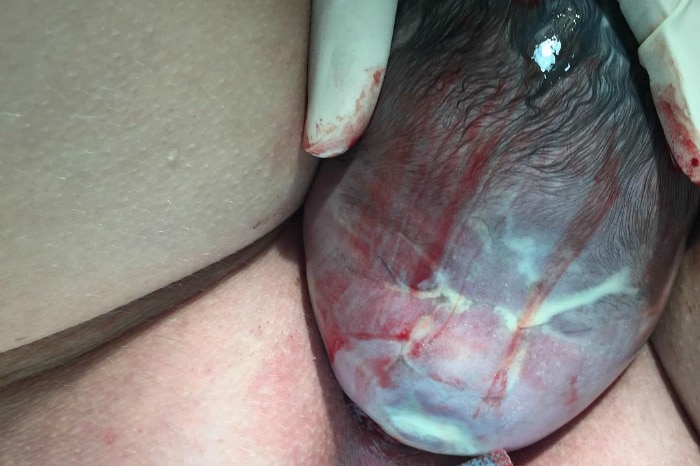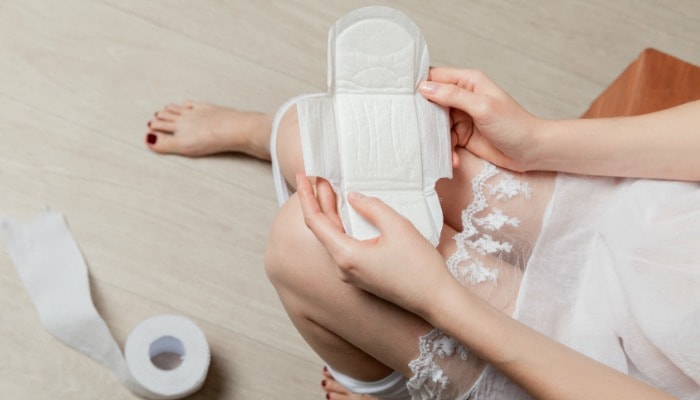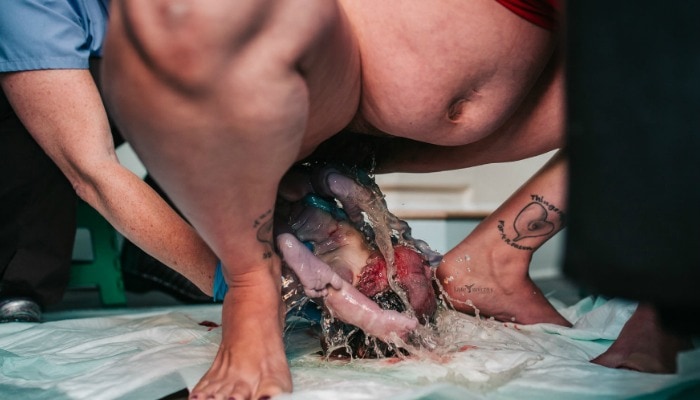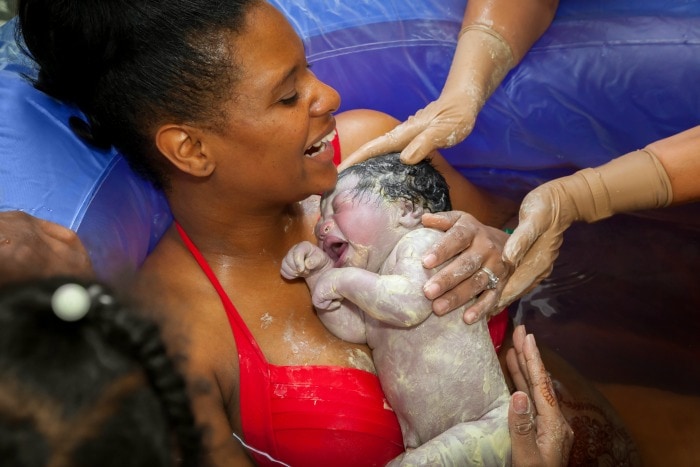Water breaking during pregnancy can be cause for alarm, celebration, and much in between. Find out what it feels like, when it can happen, how long until baby arrives, and more. Let’s get started!
Water Breaking: What do I do?
If you are currently experiencing water breaking at home, use the acronym C.O.A.T. to gather and remember the information your care provider will ask for when you call or get checked out.
C – Color
O – Odor
A – Amount
T – Time
COLOR – Amniotic fluid is typically clear, although sometimes it may be tinged pink with bloody show, or green, brown, or yellow with meconium, baby’s first poop.
ODOR – Amniotic fluid is typically odorless, or has a light, sweet smell. If an infection is present, a foul smelling odor will be noticed.
AMOUNT – When a woman experiences her water breaking, sometimes it’s a small trickle, or a slow leak, and other times it’s a big gush. Because of that, some women may need to wear a pad during labor, or even an adult diaper, depending on how much fluid is leaking. (It’s good to have these on hand because you can even use them after birth as a postpartum diaper!)
TIME – What time did water breaking begin?
If your water breaks, call your care provider to see what they recommend. Sometimes they may want you to come in immediately, and other times they may recommend laboring at home a little while before coming in. Either way, check in to see what’s best for you and your baby. (They know what’s best more than any website could.)

Water Breaking: All Your Questions Answered
Is water breaking common?
Forget what you’ve seen in the movies because most labors don’t begin with the water breaking. In fact, only 10 – 15 % of women experience their water breaking, or spontaneous rupture of membranes (SROM), as their initial sign of labor. (SOURCE)
Perhaps we hear more about water breaking as the typical way to begin labor because it’s a little bit more exciting and dramatic than the typical birth story.
“My water breaking started my labor. I woke up at 3am to go pee and felt a gush. For a second I thought it was just more pee. But then I got back into bed and could still feel leaking every time I moved around. I got up and more fluid came out so I put on a pad and did a happy dance.” Ashley P.
Odds are, you probably won’t experience water breaking while grocery shopping, driving in the car, or at work. But we’ll get to that in a little bit. For now, let’s dive into the most frequently asked questions in regards to water breaking.
What causes your water to break?
One of the many hats I wear is placenta specialist. (Women hire me to dehydrate their placenta, grind it up into a powder, and put in pills to take during their postpartum adjustment. Through placenta encapsulation, my clients hope to minimize postpartum depression, increase energy levels, stabilize hormones, and increase milk production.)
Because of this occupation, I have an intimate knowledge of placentas and the amniotic sac. (In case you didn’t know, the amniotic sac is part of the placenta. I like to think that they’re like conjoined twins.)
Because of my intimate knowledge of the amniotic sac, it’s easy for me to see how the amniotic sac breaks. Some sacs, are really tough and require a bit of effort to tear, but some are more thin and tear easily. This makes sense why some women may experience water breaking before and during labor (their amniotic sacs are more thin), but some women don’t and may even ask for the amniotic sac to be broken for them, or even push out their baby in an intact sac (their sacs are more thick). For some, a good strong kick from a full-term baby is enough to break the sac, and others, the repetitive squeeze from very strong contractions during transition tears the membrane.
And then there’s the elusive few that push their babies out with the amniotic sac intact. (see below)

“There are no words to describe this moment in time. When a baby is between two worlds and a mother needs to be at her strongest. Born in the caul (the waters never broken) is both safe and normal and can happen when labour is uninterrupted.” (PHOTO CREDIT)
How do they break your water?
For those that request their water to be broken, perhaps as a method of induction or to make labor stronger, it’s important to know that the procedure is similar to getting a vaginal/cervical exam.
Your care provider’s fingers will be in your vagina and at your cervix along with a long, slender plastic tool called an amniohook. The amniohook, which looks very similar to a very long crochet hook except it has a small sharp hook on the end, allows it to gently snag the membranes in hopes to cause a small tear.
Just like a tear in a water balloon, once there’s a tear in the amniotic sac, fluid releases. If it’s a tiny tear, only a small amount will come out. If it’s large, you may experience a big gush.

What does it feel like to get your water broken?
Most women find the procedure of breaking the water uncomfortable, but I think it’s more because she’s flat on her back and has someone’s fingers/hand in her vagina and cervix, and less because the amniotic sac ruptures. The vagina and cervix have lots of nerve endings, but the amniotic sac does not.
I’ve had my water broken for me twice, both when I was at 8 cm. The first time, I felt a lot of very warm fluid go everywhere and experienced extremely strong contractions immediately following. The second time, after I experienced a slow leak, I asked my midwife to break my water in earnest. The the procedure caused me to vomit, which caught me off guard. (By the way, strong labor did not follow, because birth does whatever it wants. 😉 )
One time I was at a birth where the woman requested her water to be broken. Surprisingly, afterwards her pain lessened and her contractions became more manageable. She had her baby within a few hours after the procedure.
If you are trying to make the decision to break your water or leave things alone, head on over here for a great article about working with your care providers and making the best decisions possible. It’s SO GOOD and something I teach every childbirth class!
How to break your water?
In no way do I recommend trying to break your water by yourself. However, there is something I thought I’d mention to you, mainly because it’s interesting.
During my second labor, I was hanging out at 8 cm (because that’s what I do every. single. time.), was over it (because transition), and decided to take matters into my own hands. After my midwife’s attempt at breaking my water was unsuccessful, I decided I was going to try to break my water by myself with my fingers.
Obviously, I was unsuccessful (duh) but since I was still very irrational, I decided I would start pushing during a contraction to see if the increased pressure would break my water. Surprisingly, I was successful, which is so crazy. By bearing down just a tiny bit during the peak of a transition contraction, I was able to rupture my membranes. So, so crazy.
(By the way, I would never recommend anybody doing what I did, especially a first time mom. Do what I say and not what I do. 😉 )

What does it feel like when your water breaks?
All women are different, as are their pregnancies. Because of that, details vary about what it feels like when a woman’s water breaks. The following are common sensations and experiences a woman may feel when her amniotic sac ruptures:
- A release in pressure
- Like peeing your pants
- Like a sudden loss in bladder control
- A pop (or two), followed by a gush or trickle
- A gush, which feels like peeing… that doesn’t stop
- Like your period has started
- A sharp, but brief pain accompanied by a pop
“My water broke during the last 15 minutes of birth. It literally felt like a water balloon popped in my vagina…which basically is exactly what happened.” Shiny L.
“My water broke as I sat on the toilet! I felt a gush and had to think for a minute….I was like I’m pretty sure I hadn’t started urinating yet!” Esmerelda O.

Can your water break slowly?
Yes! Many women are surprised to experience a slow leak or trickle instead of one big gush. If this is the case, you’ll likely be leaking for a while. It’s best to wear a pad or adult diaper to reduce any mess.
“My water broke in a restaurant as I was sitting down for lunch. I had been having some twinges of pain all morning but I wrote them off as braxton hicks contractions because they typically stopped. As I sat down, I felt a small gush and excused myself to the restroom. Thankfully, it was a only small amount and I had on black leggings so you couldn’t tell. I returned to the table to eat my lunch and let my mom know that we should probably head to triage afterwards to check if it was amniotic fluid. My nurse friend there was making fun saying I peed myself, but it turns out it was my water! It ended up being a slow leak and my OB had to finish breaking it during the last stages of labor.” Amanda M.

How long after water breaking does baby come?
Once a woman’s water breaks, birth is imminent. Exactly how imminent? Your guess is as good as mine. 😉
“With my second, my water broke during a strong contraction as I was being moved from triage to a room. I pushed that baby out 20 minutes later.” Stacy F.
“I had light bleeding and the start of contractions in the middle of the night. I walked around the mall for a couple hours in the early afternoon. After that, I went to lay down for a nap and felt a pop, fluid fill my vagina, got up and had lots more fluid coming. I started losing my plug at that point too and it was just a lot of fluids and grossness. Baby wasn’t born until 43 hours and numerous interventions later.” Alicia L.
The thing is, once the amniotic sac has ruptured, there is an increased risk of infection. Because of that, if labor does not begin on its own in a reasonable amount of time, care providers will encourage labor sometimes with natural methods and more often then not, pharmacological methods like pitocin. In my experience, once the waters break baby will come within a day or two (or three or four).
However, it’s helpful to remember that your vagina is not a vacuum cleaner, sucking up bacteria trying to become infected. More often than not, an infection happens because bacteria has been introduced via vaginal exams, amniohooks, etc.
But sometimes, if the water has been broken for a long time and labor does not come, despite everyone’s best efforts, a cesarean birth may become necessary, especially if signs of infection are present.

What is PPROM?
On the other hand, in rare circumstances, if a woman experiences preterm premature rupture of membranes (PPROM) she will be admitted to the hospital where labor may actually be discouraged. In this instance, the risk of infection is less important than the risk of a premature delivery. And yes, a baby can survive in the womb for quite a long time after the water breaks.
Why does PROM happen?
The cause of PROM is unknown. According to Medline, the following are risk factors for PROM. (SOURCE)
- Infections of the uterus, cervix, or vagina
- Too much stretching of the amniotic sac, which may happen if there is too much fluid (polyhydramnios), or more than one baby putting pressure on the membranes
- Smoking
- If you have had surgery or biopsies of the cervix
- If you were pregnant before and had a PROM or PPROM
According to this article, by waiting 18 months before you have an additional child can also decrease the risk of PROM.
INTERESTING FACT: “Daily supplementation with 100 mg of vitamin C after 20 wk of gestation effectively lessens the incidence of premature rupture of membranes.” (SOURCE)
Can your water break while lying down?
Yes. A woman’s water can break while lying down, or in any other position she may find herself in, even sitting on a birthing ball or in a car. Her water can even break during or after having sex. (Wouldn’t that be startling?)
“My water breaking felt like a gush! With my first, it woke me out of a deep sleep. I guess somehow I knew what was happening because I flew out of bed and ran to the bathroom.” Stacy F.

Can water breaking be a false alarm?
Yes. A woman may experience discharge, pee, sweat, and/or her mucus plug and confuse these things with her water breaking. With all that’s happening in a pregnant woman’s body, it’s pretty understandable to be confused and unsure of what exactly is going on. Sometimes, the extra discharge a woman experiences during pregnancy can be a similar amount of wetness that comes with a slow leak of amniotic fluid!
The best thing to do if you’re unsure if your water has broken is to make an appointment with your care provider, or head to the hospital to get checked out. Care providers have these “nifty swab things” that change color when they come into contact with amniotic fluid. They’ll know pretty quickly if you are leaking amniotic fluid.
NOTE: A few times in my career a few of my doula clients were experiencing increased wetness and were unsure if it was amniotic fluid or just normal discharge. However, when they got checked, the amniotic fluid swabs came back negative. Later on, however, the leaking continued and eventually became more prevalent. Upon a repeated check, the test came back positive. In my opinion, it seemed like the initial swab did not come into contact with amniotic fluid, despite the slow leak she was experiencing. The moral of the story here is that sometimes these amniotic fluid tests can produce false negative results. False positives, however, are uncommon.
Can you go into labor without your water breaking?
Yes! Contrary to popular belief, most women (85 – 90%) begin the first stage of labor without their water breaking. The water can break:
- once early labor has already begun,
- during active labor,
- in transition,
- while mama is pushing (see photo below), and
- baby can even be born in the amniotic sac! How cool is that?! (scroll above for photo)
“I remember being on my hands and knees at 10 cm and my body was starting to involuntarily push. I beared down and gave it all I had. At that point my water, that hadn’t broken yet, literally felt like it exploded and I turned to my midwife to ask if that was my baby. It wasn’t. We all had a good laugh.” Heather F.

(Amazing photo captured by lifebykate.com)
Can your water break without having contractions?
Yes. When it comes to birth, the sky’s the limit! There are many ways in which labor unfolds. During my third birth my water broke, and contractions followed, but not necessarily labor. Head on over here to read my homebirth in the hospital transfer story.
“I had just woken up and was still in in bed. I felt a very weird internal POP sensation and immediately knew what just happened. I stood up and amniotic fluid gushed out. With it being my first baby, I thought it was GO TIME. Little did I know, contractions would start nearly 12 hours later.” Heather F.
“I was walking and felt a small pop and a small gush of warm fluid. It was not enough to saturate more than my underwear and it felt like I had started my period. 4 hours later, I was sitting on the couch cross legged and having light contractions every ten minutes or so. All of a sudden tons of warm fluid started coming out. It didn’t hurt, but it was an odd sensation. I got up, went to the bathroom, and sat on the toilet until I stopped leaking. My contractions did not intensify after that like I expected they would. They just kept coming ten minutes apart for a few hours.” Laura S.
What color is it when your water breaks?
Amniotic fluid is clear but sometimes when a woman experiences water breaking the fluid is not always clear. In these less common scenarios the fluid may be tinged pink with bloody show, or green, brown, or yellow with meconium, baby’s first poop. Usually meconium in the waters is a variation of normal, but other times it’s an indication that baby may need a little bit of assistance.
“The doctor broke my water when I was at 9cm and found meconium. I didn’t feel anything since I’d had an epidural. I was 41 weeks exactly. Baby ended up needing respiratory assistance at birth a few hours later. She was gasping and her oxygen was a little low. They monitored her in NICU for about 2 hours and she was fine.
♥️” Tracy M.
Can I Have a Water Birth If My Water Has Broken?
Yes.
“Some hospitals still restrict a woman from laboring in the water if her membranes are ruptured. Based on the current and past literature, this is absurd. No evidence exists of increased infectious morbidity with or without ruptured membranes for women who labor and/or birth in water. “
“Laboring mothers have an advantage when the baby is descending and moving out—nothing is moving up and in. Things that we put into laboring vaginas may cause infections, such as probes, fingers, AmnihooksTM, scalp hooks and so on.” (SOURCE: Barbara Harper, my trusted water birth guru)
Remember, your vagina is not a vacuum cleaner!

Water Breaking Complications
When the water breaks, sometimes the timing is not ideal. In some circumstances, like at the grocery store, it’s more embarrassing than anything, but other times, like when it happens before 37 weeks, it’s worrisome. Before we end this blog post, let’s talk about a few scenarios where the water breaking would be a problem.
Water Breaking in Bed
Many women are worried that their water will break in bed and their mattress will be ruined. If it gives you peace of mind, even if your water breaks while in bed, you’ll likely hop right out and any wetness you experience will be mostly absorbed by your clothes and linens.
However, some women feel more comfortable preparing the bed like one would prepare it for a homebirth. At minimum, place a chux pad under the sheets. However, if you want to take things further, just get a waterproof mattress pad. Those are a good investment when you have small children anyways.
Water Breaking in Public, at Work, Etc.
When I had an office job while pregnant with my first, my boss and co-workers were a little concerned about my water breaking while at work, since I planned to work until 40 weeks pregnant. Thankfully, I had my own office so if it did happen I knew I would likely have privacy. However, I did tell them on the off chance that it happened to me, I would just pop on out of there and go home.
Other than reassure them I wasn’t a ticking time bomb, waiting to shoot out my baby at the most inopportune moment, I did decide to keep a chux pad and towel in my car just in case. I never ended up needing it, but the peace of mind was helpful for everyone.
If you are employed out of the home towards the end of pregnancy, have a plan in mind in case you experience water breaking while at work (or out and about). In a gallon ziplock bag, pack a chux pad or two, a pad and a adult diaper in your purse. Hopefully you won’t need it, but if you do you’ll be glad it’s there!
TO BUY:

Water Breaking During Membrane Sweep
Sometimes full-term women agree to have their membranes swept, which feels like a very invasive (rough even?) cervical exam. Basically, a care provider places their fingers through the cervix and tries to separate the amniotic sac from the uterus. After this very uncomfortable procedure, contractions follow that sometimes turn into labor. (Only a woman desperate to not be pregnant anymore would try this natural method of induction. Ha.)
Unfortunately, this procedure could accidentally cause the water to break. Albeit rare, it’s important to know that a risk of a membrane sweep (also called stripping the membranes) is the premature rupture of membranes.
Water Breaking Before 37 Weeks
When a woman’s water breaks before 37 weeks, this is called preterm premature rupture of membranes (PPROM) which has already been discussed in this post. If you are experiencing this condition, contact your care provider immediately because your baby is at risk for preterm delivery and other complications.
TIP: If your water breaks or labor begins prior to 37 weeks make sure you head to a hospital that has a NICU. If you don’t, after birth your baby will likely be transferred to another hospital that has a NICU and you will be left behind until discharged.
Water Breaking with Polyhydramnios
Polyhydramnios, a condition where there is too much amniotic fluid, has its own set of problems, but one in particular should be mentioned when speaking of the water breaking. Sometimes when there’s too much fluid, there’s a higher risk of cord complications, specifically cord prolapse, when the water breaks. If this is a concern, speak with your care provider to find out what course of action is right for you and your baby.
Water Breaking with Group Strep B
Group Beta Strep (GBS) is a normal bacteria found in the intestines and vagina. According to the CDC 10-30% of women are colonized with this normal bacteria. The problem with GBS is that it may cause GBS disease in infants which can cause sepsis, pneumonia and sometimes even meningitis. Symptoms in infants may include…
- fever
- feeding problems
- breathing problems
- irritability or fussiness
- inactivity or limpness
- inability to maintain an adequate body temperature
Standard protocol for GBS+ pregnant women is to administer antibiotics during labor. This protocol has been effective as it has decreased the number of GBS disease in infants from 1.7 cases per 1,000 live births in the early 1990s to 0.34–0.37 cases per 1,000 live births in more recent years.
Water breaking combined when a woman is GBS+ often alters birth plans in regards to when a woman plans to arrive at the hospital for labor. Care providers will likely want to begin administering antibiotics as soon as possible. (My local hospital does a “loading” dose of 2mg, another 1 mg dose 2 hours later, and then again every 4 hours.)
TIP: Consider natural remedies to eliminate GBS during pregnancy. Perhaps you could avoid this whole scenario altogether!

Water Breaking: All Your Questions Answered
At some point all pregnant women will experience their water breaking whether before or during labor, spontaneously or with encouragement. Whether your experience is straightforward or of the complicated variety, one thing we know for sure is that when the water breaks, baby will be coming soon (ish)!
Leave a Comment
What was your experience with water breaking? Leave a comment and share your story. We’d love to hear from you!

Kallie
Sunday 17th of July 2022
With my first, I woke up around 6a and walked quickly to the bathroom. It felt like I was about to start my flow of my period. Sure enough, I made it to the toilet, and my water broke, nice and clear. My contractions started within 10 minutes, and were 7 min apart by the second one. I used a small pad on the way to the hospital, but when I was in active labor (about 3 hours later), I remember in my haze, amnionic fluid soaking everywhere when I vomited. Ugh. I had an emergency c-sec 11 hours after labor began.
With my second, my labor once again started around 6a. I'd been in active labor for about 5 hours when my water broke. I delivered VBAC 9 hours after labor started.
Oddly - for years (until perimenopause), my periods almost always started around 5-6a, and I'd wake just when they did. Don't know why but it was convenient. Water breaking didn't hurt, but be aware, you continue to leak and sometimes gush when you move around a lot (rolling onto my side, with #1).
Haley Jones-Shumaker
Wednesday 5th of December 2018
My water broke while I was in the bed sleeping. It woke me from a deads sleep, and I immediately rushed to the bathroom tub. The initial 'pop' felt like the giant air bubble had moved from the bottom of my belly to my chest, and FAST! Think when you replace the water jug from a water station where the air bubble transfers as you flip the jug. Whiltst in the shower, my water just gushed and gushed out. So much so that my drain couldn't empy fast enough! I weighed myself right before I had left for the hospital (about 40 minutes after my water broke, and contractions came on like a sudden tornado!), and I had lost 10 pounds of fluid! and I was still having small gushes of fluid on the way to the hospital that felt like bladder incontinence. Labor had started immediately, but due to necessary interferance, I wasn't able to deliver my baby until after nearly 11 hours of labor, both dormant and active. A few minor complications along the way, but my labor and delivery went pretty much by the book or any dramatized movie birth lol. My water broke, and labor was only 30-40 minutes behind.
My sister on the other hand, was one of those rare few that had been leaking water for 2 weeks! And the test kept coming back negative due to the position she would get into to have the test done (i.e. on her back with feet in stirrups). Ultimately, because of the misguidance of the practioners, she had to have an emergency CS because her baby was at high risk of infection and a contraction causing permanent neck/spinal damage. She had a pitocin induced labor and labored for 46 hours before the emergency CS. Her daughter was kept in NICU for 2 weeks due to an infection that was casued from her water leaking for 2 weeks and the repeated testing. My sister was also kept for a week due to her also having a serious infection. Thankfully everyone went home healthy as can be, considering the horror story she and her baby went through. She also had an extremely 'easy' pregnancy, but a terrible labor and delivery. I had a horrible pregnancy with extreme pain and constant appointments of physical therapy and ultrasounds due to unexpected bleeding throughout the pregnancy. But then my labor and delivery was fairly easy, considering what my sister and other women have gone through. It just goes to show that every woman is different with how our bodies react and take charge. Most of the time, things will happen as they should for good reason, and everything usually works out in the end. Even if nothing makes sense in the beginning. :-)
Kallie
Sunday 17th of July 2022
@Haley Jones-Shumaker, I had an easy pregnancy, very complicated birth and postpartum with #1, and a difficult pregnancy and very easy birth including post-partum with #2! I had preeclampsia with both - first at 39 1/2 weeks (I delivered at 40 weeks exactly), second at 24 weeks spending 11 weeks on bedrest with a toddler. With my first, I had postpartum preeclampsia as well, so rushed ER visit, refused to be admitted, sent home on strict bedrest for another 10 days.
The things we do for our kids!
Lindsey
Thursday 6th of December 2018
Thanks for sharing your story! You're right, every woman and birth is different. :)
Mary Lembi
Sunday 30th of September 2018
What happens when mother is 5 1/2 centimeters, water bag isn't broken, and she still hasn't delivered at all and Midwife, just waits, and husband say's she'll will have baby by tommorw, What then and she already had c-section about 3 years ago! and now wants to go natural at home! I need to hear anwser this girl is so very physically tired!
Em
Saturday 11th of August 2018
SO do you mean even if your water breaks and your not having 4:1:1 contractions that you just stay home until you do? Also what are chux pads in Australia? Thanks